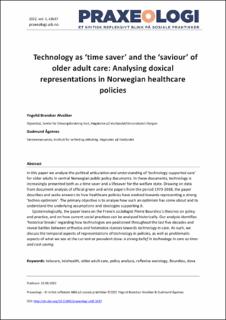Technology as ‘time saver’ and the ‘saviour’ of older adult care: Analysing doxical representations in Norwegian healthcare policies
Peer reviewed, Journal article
Published version
Permanent lenke
https://hdl.handle.net/11250/3055093Utgivelsesdato
2022Metadata
Vis full innførselSamlinger
- Import fra CRIStin [3604]
- Institutt for velferd og deltaking [1018]
Originalversjon
Praxeologi - Et kritisk refleksivt blikk på sosiale praktikker. 2022, 4:e3637. 10.15845/praxeologi.v4i0.3637Sammendrag
In this paper we analyse the political articulation and understanding of ‘technology-supported care’ for older adults in central Norwegian public policy documents. In these documents, technology is increasingly presented both as a time saver and a lifesaver for the welfare state. Drawing on data from document analysis of official green and white papers from the period 1973-2018, the paper describes and seeks answers to how healthcare policies have evolved towards representing a strong ‘techno-optimism’. The primary objective is to analyse how such an optimism has come about and to understand the underlying assumptions and ideologies supporting it.
Epistemologically, the paper leans on the French sociologist Pierre Bourdieu’s theories on policy and practice, and on how current social practices can be analysed historically. Our analysis identifies ‘historical breaks’ regarding how technologies are positioned throughout the last five decades and reveal battles between orthodox and heterodox stances towards technology in care. As such, we discuss the temporal aspects of representations of technology in policies, as well as problematic aspects of what we see at the current or prevalent doxa: a strong belief in technology in care as time- and cost-saving.

